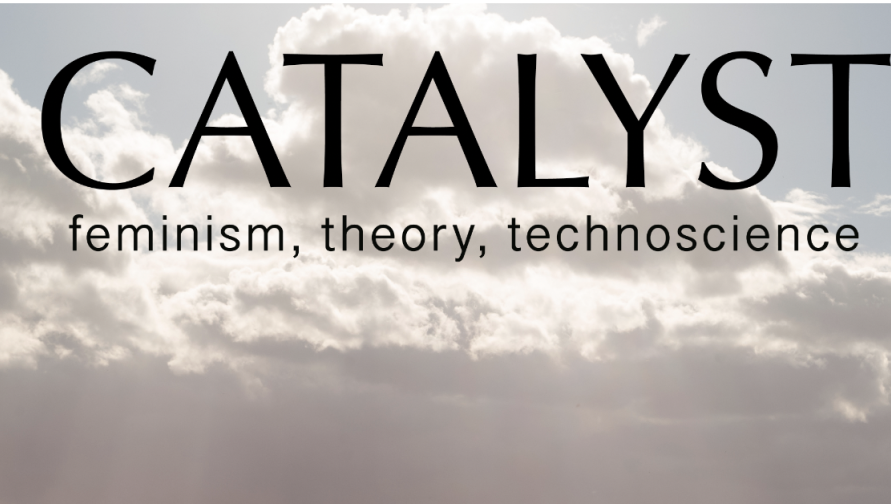
Shared by the Catalyst Editorial Team:
We are pleased to announce the publication of the Spring 2023 (Vol. 9 No. 1) issue of Catalyst: Feminism, Theory, Technoscience, featuring a Special Section on Domestication of War, edited by Diana Pardo Pedraza, Xan Chacko, Jennifer Terry, and Astrida Neimanis. Our nuanced and poignant cover is titled, “Outdoor Seating Area at the Visitor's Center” by Joshua Kim.
This Special Section broadens and qualifies the terms through which the relationship between home and militarization have been understood. It joins a vibrant and growing field of transdisciplinary scholars who address the militarization of everyday life by attending to domesticity and practices of domestication, while grappling with how the home naturalizes and becomes a catalyst for militarism: How do ordinary and domestic objects, technologies, spaces, and infrastructures make violence feel at home in the world? It is concerned with the domestic life of militarization as oikos: the household, habitat, and milieu of violent material relationships that are both ongoing and latent. The domestic is not just a discrete, private space; it also extends into public spaces like neighborhoods, local businesses, waste disposal infrastructures, hospices, and crop fields. Developed within an editorial process rooted in a feminist ethos, the articles collected here provide critical and alternative methodologies and disciplinary forms for considering militarism's aesthetics, affects, and modes of appearance. This collection resists conventional spatialities, temporalities, and incarnations of war while calling attention to the obscuring of violence through practices of care and marketing operations.
After an “Introduction” by Diana Pardo Pedraza, Xan Chacko, Jennifer Terry, and Astrida Neimanis, the Special Section features an “Artist Statement” by Joshua Kim, and then seven articles: “Homing Toxicity: The Domestication of Herbicidal Warfare” by Natalia Duong, “The Inheritance of Militarization: Toxic Gifts, Furtive Critique, and Survivance in Postwar Bosnia” by Saida Hodžić, “Properties of War: The Militarization of Housing Policy and Urban Planning in Contemporary Azerbaijan, by Zsuzsanna Dominika Ihar, “Domesticity at War: Bringing the War Home in Martha Rosler’s House Beautiful Wartime Photomontages” by Caren Kaplan, “Invert Syrup, Feminist Snap: Anzac Biscuits and Feminist Resistance to Imperial Logics” by Lindsay Kelley, “Between Past and Future: The Slow Death of Indefinite Detention” by Michelle C. Velasquez-Potts, and “All That Is Solid Burns into Smoke: US Military Burn Pits, Petrochemical Toxicity, and the Racial Geopolitics of Displacement” by Zoë H. Wool.
It also includes a Roundtable titled, “Housewife’s Secret Arsenal” with the following eight short essays: “Starch: Faultless Premium Spray Starch” by Deborah Cohler, “Teflon: Slipperiness and the Domestication of Toxicity” by Heather Davis, “Ladybugs: The (Natural) Enemy of My Enemy Is My Friend? Enlisting Ladybugs into the War on Insect Pests” by Kaitlin Stack Whitney, “Business Cards: Rolodex Half-Life, An Exposed Life Told in Cards” by Salvador Zárate, “Washing and White Goods” by Liam Grealy and Tess Lea, “Window: Spatializing Occupation” by Niharika Pandit, “Home Drone: How to Militarize the Smart Home with the Ring Always Home Camera,” by Michael Richardson and J.D. Schnepf, and “‘Loved by Moms and Law Enforcement Alike’: Militarizing Civilian Bodies through Bulletproof Fashion” by Barbara Sutton. The Special Section concludes with a Review Essay titled “Wartime’s ‘Undeniable Linkages’: Feminist Studies of Everyday Militarisms across Time and Space” by Gabi Kirk on three books: Jennifer Terry’s “Attachments to War: Biomedical Logics and Violence in Twenty-First-Century America,” Caren Kaplan’s “Aerial Aftermaths: Wartime from Above,” and Crystal Mun-hye Baik’s “Reencounters: On the Korean War and Diasporic Memory.”
This issue of Catalyst also contains seven Original Research articles: “Memories and Motherhood in the Rhythms of Ugandan Computing” by Kerry Holden, Matthew Harsh, and Ravtosh Bal, “Pollination and the Horrors of the Yield: Scarcity and Survival in the Glasshouse” by Krista Lynes, “Moral Economies of Life and Death: Agricultural Improvement, Imperialism, and Chemical Kinships with Reactive Nitrogen” by Emma Cardwell, “The Girl in the Bubble: An Essay on Containment” by Dylan Mulvin and Cait McKinney, “Fluid-Bonding and Feelings Condoms: Ambivalent Technologies of Queer Safer Sex” by Chris Barcelos, “Scripting Consenting Fictions in Sex Technology Imaginaries” by Josef Nguyen, and “Data Surrogates as Hosts: Politics of Environmental Governance” by Akshita Sivakumar.
The Spring 2023 issue concludes with two book reviews of recent noteworthy books. Jaya Keaney reviews Natali Valdez’s “Weighing the Future: Race, Science, and Pregnancy Trials in the Postgenomic Era,” and Mia Florin-Seftonreviews Sara Matthiesen’s “Reproduction Revisited: Family Making and the Limits of Choice after Roe v. Wade.”
We would like to especially thank our senior managing editors, Sandra Carpenter and Aditya Anupam, our junior managing editors, Janelle Li and Ren Zheng, and also Pam Perrimon for their hard work in publishing this complex and thought-provoking issue. This issue would not have been possible without their generosity and professionalism!
A special thanks also to Indiana University, Bloomington and the Digital Integrative Liberal Arts Center at Georgia Tech for their generous financial support of the journal.
Catalyst is an online, juried journal that expands the feminist and critical intellectual legacies of science and technology studies into theory-intensive research, critique, and practice. Catalyst invites submissions of papers and media work, as well as proposals for future special sections or critical perspective discussions. Please direct any questions to editor@catalystjournal.org.


